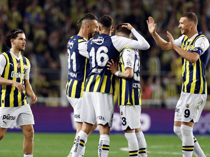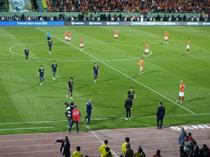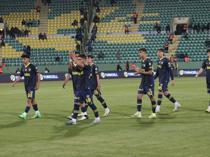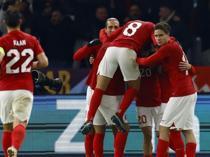Mideast buying spree changing European football
James M. Dorsey Hürriyet Daily News

Argentinian ace Sergio Aguero (R) is one of the several world-class players that English Premier League club Manchester City purchased under the ownership of Mansour bin Zayed Al Nahyan. AFP Photo
Middle Easterners with petrodollars to burn have been altering the face of European football with club takeovers and broadcast deals as part of a multi-layered strategy to boost international images, strengthen national pride, create business opportunities and generate tourism.In financial terms and purchasing power, Middle Eastern cash has bolstered teams it has acquired in Britain, France, Spain and Germany largely by fueling expensive transfers and enabling clubs to upgrade their facilities, even if it has yet to produce trophies. Critics charge, however, that such money is insufficient to buy success and note that some clubs have suffered the downside of failed and politically troubled Middle Eastern acquisitions.
The Middle East’s lists of acquisitions is impressive, even if Gulf buyers have at times signaled their refusal to buy at any price and found out the hard way that money cannot buy everything. Qatar has so far failed to secure a prize catch, Manchester United, reportedly because of a discrepancy of several hundred million dollars between the asking price and the Gulf state’s bid; Dubai International Capital’s efforts several years ago to gain control of Liverpool FC failed too, as did Qatar’s attempt last year to gain control of AS Roma. Another bid by Qatar’s sovereign wealth fund, the Qatar Investment Fund, to acquire the media agency that controls the broadcasting rights to world football body FIFA’s World Cup lost out to a London-based private equity firm, Bridgepoint Capital.
Nevertheless, the region’s football-related European holdings, sponsorships and acquisition target list reads like a who’s who. The spree was kicked off by Emirates Airlines as far back as 2004, with its 15-year sponsorship of Arsenal and the renaming of the club’s stadium as the Emirates Stadium. Other Emirates European sponsorships followed, including Milan, Real Madrid, Paris Saint Germain, Hamburg, as well as FIFA itself.
Manchester City fans enthusiastically greeted the Middle East’s first acquisition of a European club in 2008 by wearing Arab headdress and waving British pound notes with the picture of the queen replaced by a Gulf sheikh at the team’s first post-acquisition match. Little wonder given that the new owners within 24 hours of their takeover had put 100 million pounds on the table for player acquisition and clinched Real Madrid’s Brazilian forward Robinho for a record 32.5 million pounds when he had seemed destined for Chelsea. A stream of high-profile acquisitions followed. The team’s performance has improved radically, with Manchester City winning in 2011 its first FA Cup in 42 years and qualifying for the UEFA Champions League for the first time. The club has since concluded a 10-year, 400 million-pound sponsorship deal with Abu Dhabi carrier Etihad.
Arab culture
Last year, Spanish club Getafe was acquired by Dubai-based company Royal Emirates Group for an estimated $100 million, while financially troubled second-division German club 1860 Munich were bought by 34-year old Abu Dhabi-based Jordanian businessman Hasan Abdullah Ismail. However these purchases were exceptions rather than the rule for the UAE’s sports strategy. Despite its acquisitions, the UAE – unlike rival Qatar – seems more narrowly focused on the commercial aspects of sports with sponsorships and the hosting of international tournaments.
Fans have so far been willing to accept cultural changes that accompany the Arab acquisitions, such as Sheikh Abdullah’s replacement of bookmaker William Hill Plc as Malaga’s jersey sponsor because gambling is banned under Islamic law, while United Nations culture agency UNESCO and Royal Emirates plans to set up a pavilion about Arab culture at Getafe’s stadium. Nonetheless, Real Madrid’s recent decision to remove a Christian cross from its official logo, in what it described as the cost of doing business in a globalized world has sparked ire, particularly among anti-Muslim right-wingers. The removal came as Real Madrid embarked on the construction of a $1 billion sport tourist resort in the UAE, scheduled to open in 2015.
Critics argue further that despite City’s successes, Arab oil money is unlikely to quickly produce trophy winners. “If a club spends a lot of money quickly, it takes time for the team to settle down. There’s no easy way of winning the Premier League. You have to deserve it,” legendary former Manchester United goal scorer and current board member Sir Bobby Charlton told the Daily Mirror last year. He went on to argue that “you get a bit of an affiliation with a football club when this sort of thing is taking place, and not just piling loads and loads of money in.”
No bed of roses
Some clubs have learnt that deep pockets do not mean long-term commitment. Three months after acquiring Portsmouth, Emirati multimillionare Sulaiman al-Fahim sold the bulk of his stake to Saudi property tycoon Ali al-Faraj amid reports that his flagship Hydra Village project in Abu Dhabi was floundering. Soon after the takeover, al-Faraj announced that he was selling the club. But with no buyer, Portsmouth went into receivership.
Geneva’s Servette and Austria’s Admira Wacker have not fared much better. Servette is now on the brink of collapse after Iranian businessman Majid Pishyar, who acquired it in 2008, filed for bankruptcy earlier this year. Pishyar tried unsuccessfully to attract government funding by last year appointing Robert Hensler, a former top civil servant in the canton of Geneva, as Vice President. His earlier efforts to salvage Admira failed too. Servette’s problems come on the heels of the bankruptcy of Swiss clubs Neuchatel Xamax, whose Chechen owner was arrested on charges of fraud and financial mismanagement.
















